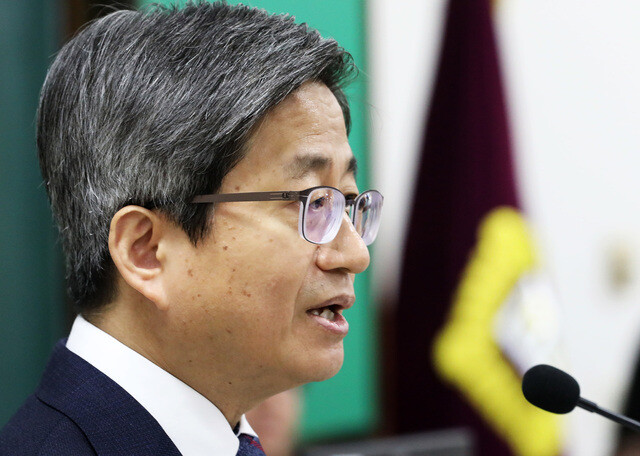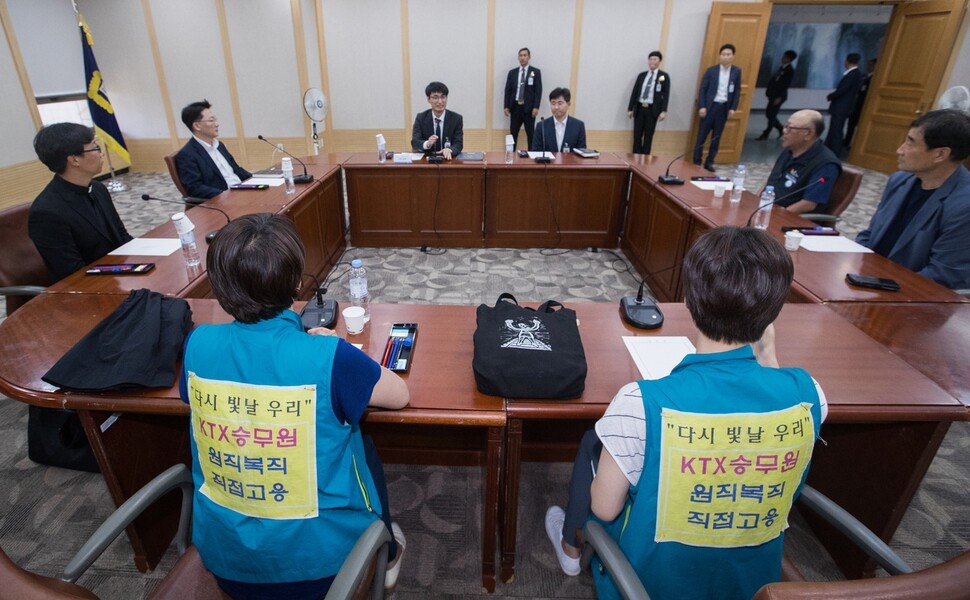hankyoreh
Links to other country sites 다른 나라 사이트 링크
Supreme Court chief justice delays decision on investigations into abuse of judicial authority

Supreme Court Chief Justice Kim Myeong-soo’s “contemplation” continues amid a deepening wave of distrust for South Korea’s judiciary, including a string of accusations of “judicial misconduct” during the tenure of predecessor Yang Sung-tae. With Kim avoiding a clear statement on the prosecutors’ investigation or accusations – citing his need to “gather opinions” – the outcry and controversy in and around the courts has been growing by the day.
On May 30, Chief Justice Kim announced that he would listen to the opinions of judges before reaching a decision on the handling of findings from a special investigation team (headed by National Court Administration director Ahn Cheol-sang) probing allegations of abuse of judicial administrative authority.
“Judges’ meetings will be taking place shortly at courts at different levels,” he said.
“I think that those opinions are something I will need to listen to.”
Chief Justice Kim went on to say that it was “natural and preferable to have front-line judges share their opinions on a momentous issue like this.”
He added that he planned to “make a decision taking into account the opinions of judges, as well as internal and external opinions from investigation reports and personal reports.”
Chief Justice Kim’s remarks were seen as hinting that he would present his plan for requesting investigations to prosecutors and other follow-up measures after first hearing opinions from judges at an exclusive meeting of Seoul Central District Court judges and a meeting of Seoul Family Court judges scheduled for June 4. The issue is also scheduled to be discussed at a June 11 ad hoc meeting of the National Judicial Representatives’ Conference – leading some to speculate the Chief Justice’s “weighing” of the matter may last until around mid-June.
On the morning of May 30, the National Court Administration met for a second straight day to discuss the Supreme Court’s response to the situation at a panel discussion presided over by deputy director Kim Chang-bo and attended by office directors (High Court judges), deputy directors-general (chief judges), and directors-general (judges). During the meeting, the participants reportedly discussed whether to lodge accusations and request investigations against Yang and other parties, along with the different legal possibilities and anticipated repercussions in response to demands for retrials by parties to rulings implicated in “transactions.”
National Court Administration director Ahn Cheol-sang, who heads the special investigation team, said there was “no plan at present to re-investigate” Yang or others in connection with allegations of improper transactions.
Among court insiders, opinions on how to respond once the special investigation team completes its probe ran the gamut from calls for thorough investigations by the prosecutors, a special prosecutor, or a parliamentary audit to insistence on resolving the matter through internal disciplinary action and “self-cleansing” by courts. Signs of dissension in the ranks were evident, with some judges openly taking issue with the team’s investigation and calling the interpretations in National Court Administration documents “a stretch.”
With the courts yet to decide on a position, parties to cases implicated in transactions, attorneys’ groups, and court unions have been up in arms over the “compromising of court neutrality” in response to the National Court Administration documents alleging trial “deals.”
After previously occupying the Supreme Court’s main courtroom on May 29 for a surprise demonstration, dismissed KTX train attendants met the following afternoon with Chief Justice Kim’s chief of staff Kim Hwan-su at the Supreme Court to demand the Chief Justice assert his authority to decree a retrial on a 2015 case in which the Supreme Court ruled that KTX train attendants were “not regular employees of KORAIL.” Current law does not grant the Supreme Court Chief Justice authority to demand a retrial or the ability for courts themselves to request retrials. The former attendants also demanded that all victims of “judicial misconduct” be granted an audience with the Chief Justice and called for disclosure of related documents and a thorough investigation.

In a press conference organized in front of the Supreme Court’s east gate that afternoon, parties to the cases including the KIKO Joint Countermeasures Committee, Unified Progressive Party Countermeasures Committee, Korean Confederation of Trade Unions, and the Korean Metal Workers’ Union (KMWU) joined the groups MINBYUN-Lawyers for a Democratic Society and People’s Solidarity for Participatory Democracy to announce that 14 “groups victimized by judicial misconduct” would be jointly filing complaints with prosecutors next week against Yang and others.
During their press conference, they called on Chief Justice Kim to request an accusation against or investigation of Yang and other, disclose all related documents, and establish measures to prevent similar incidents from occurring in the future. MINBYUN demanded that Yang be detained for investigation and called for a parliamentary audit.
The court headquarters of the Korean Government Employees’ Union (KGEU) held a press conference the same morning for the lodging of abuse of power accusations against Yang; former National Court Administration director Park Byeong-dae, vice director Im Jong-heon, and planning and coordination office director Lee Min-geol; and sentencing committee permanent member Lee Gyu-jin. In a bill of indictment signed by 3,453 court employees, the Court Union called for punishment of all parties, insisting on an investigation “by an investigative body rather than the judiciary itself.”
In another press conference that day, KMWU called for the detention and investigation of Yang and retrials in related cases, arguing that it had “emerged that Supreme Court decisions reversing legitimate rulings in cases involving Cort Guitar workers, Ssangyong Motor, and regular wages were all the products of political deals by courts and the Blue House.”
Roughly a dozen filed complaints alleging judicial compromise have been received by prosecutors to date, with more expected to emerge from other parties to cases implicated in the “judicial transactions.”
By Yeo Hyeon-ho, senior staff writer, and Ko Han-sol, staff reporter
Please direct comments or questions to [english@hani.co.kr]

Editorial・opinion
![[Editorial] Does Yoon think the Korean public is wrong? [Editorial] Does Yoon think the Korean public is wrong?](https://flexible.img.hani.co.kr/flexible/normal/500/300/imgdb/original/2024/0417/8517133419684774.jpg) [Editorial] Does Yoon think the Korean public is wrong?
[Editorial] Does Yoon think the Korean public is wrong?![[Editorial] As it bolsters its alliance with US, Japan must be accountable for past [Editorial] As it bolsters its alliance with US, Japan must be accountable for past](https://flexible.img.hani.co.kr/flexible/normal/500/300/imgdb/original/2024/0417/6817133413968321.jpg) [Editorial] As it bolsters its alliance with US, Japan must be accountable for past
[Editorial] As it bolsters its alliance with US, Japan must be accountable for past- [Guest essay] Amending the Constitution is Yoon’s key to leaving office in public’s good graces
- [Editorial] 10 years on, lessons of Sewol tragedy must never be forgotten
- [Column] A death blow to Korea’s prosecutor politics
- [Correspondent’s column] The US and the end of Japanese pacifism
- [Guest essay] How Korea turned its trainee doctors into monsters
- [Guest essay] As someone who helped forge Seoul-Moscow ties, their status today troubles me
- [Editorial] Koreans sent a loud and clear message to Yoon
- [Column] In Korea’s midterm elections, it’s time for accountability
Most viewed articles
- 1‘Right direction’: After judgment day from voters, Yoon shrugs off calls for change
- 2[Editorial] Does Yoon think the Korean public is wrong?
- 3Where Sewol sank 10 years ago, a sea of tears as parents mourn lost children
- 4Strong dollar isn’t all that’s pushing won exchange rate into to 1,400 range
- 5[Editorial] As it bolsters its alliance with US, Japan must be accountable for past
- 6Japan officially says compensation of Korean forced laborers isn’t its responsibility
- 7Korea ranks among 10 countries going backward on coal power, report shows
- 8Faith in the power of memory: Why these teens carry yellow ribbons for Sewol
- 9US, Japan and China move to become self-sufficient in semiconductors
- 10[News analysis] Watershed augmentation of US-Japan alliance to put Korea’s diplomacy to the test